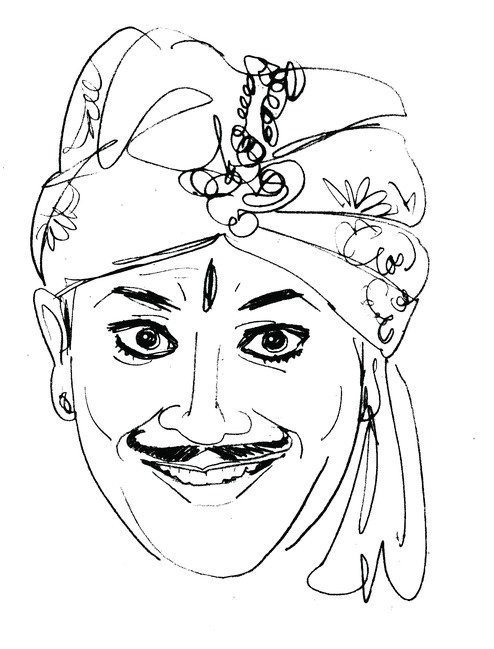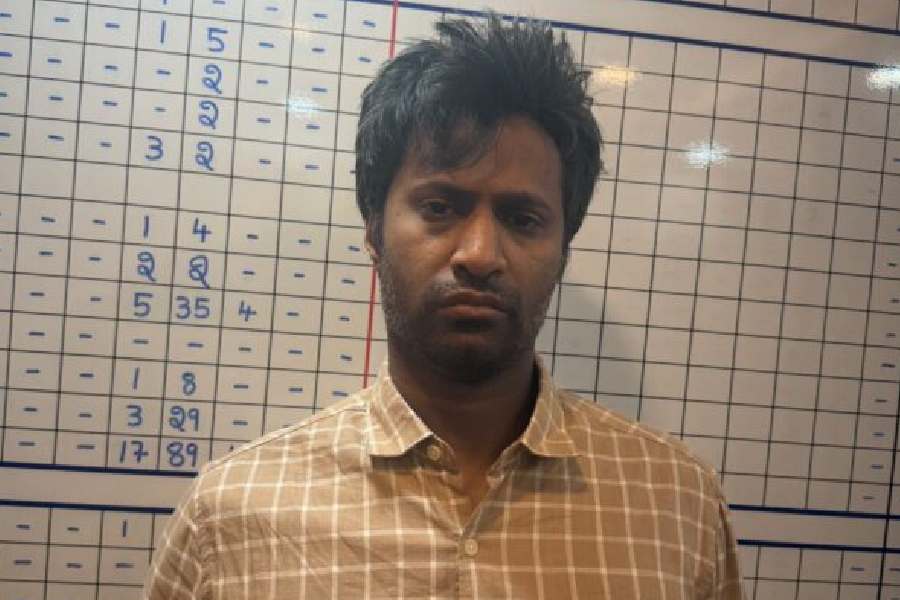
As a child, P.C. Sorcar Jr used to think he had two fathers. "One was the magician and the other, the person we saw at home - drinking coffee, reading newspapers, spectacles perched on nose, perpetually reprimanding us, asking us to study. And I always thought that this is where the switch happened - one father took a break and the other father took over," says the magician.
We are sitting in Sorcar's office on the first floor of his three-storey residence in south Calcutta. He is wearing a black tee and trousers. His eyes are big and expressive, his voice is deep and theatrical and his moustache thin but curling perfectly at the ends.
The house is named Indrajaal Bhavan after a classic act of his father Protul Chandra Sorcar or P.C. Sorcar Sr. The room itself is lined with shelves laden with memorabilia, trophies, a portrait of Sorcar Jr resplendent in his performance gear, another one of his father - wide-eyed, arms spread out in wonder - a glass box with a metal turban and so on.
Sorcar continues, "My father would not allow us to enter this room. He used to say, 'Where this room is concerned, it should be one-way traffic only.'"
There are rows of books stacked in a wall-to-wall chestnut bookcase that climbs right up to the ceiling. There are manuscripts too - on magic, wrapped in yellow cloth with Shri Ram written all over. "You cannot become a magician if you do not have knowledge," he says following my gaze.
I am told that once upon a time the room used to have a skylight. A curious Sorcar Jr used to peep in on his father through it. "And that is how I learnt magic," he says.
I am meeting Sorcar a few days before the release of Australian writer John Zubrzycki's book, Empire of Enchantment: The Story of Indian Magic. Zubrzycki has worked in India as a diplomat and a correspondent among many others things, and reportedly, this book deals at length with Sorcar's father.
Sorcar, however, tells me, "The book is not about my father alone, it is about how India has been the land of magic for many, many years."
We talk about the book for a fair bit and Zubrzycki's awe for Indian culture. Sorcar talks about references to magic in the Vedas.
And then the discussion veers wondrously, as such discussions tend to do, to globetrotters who came to India - Marco Polo, Hiuen Tsang, Vasco Da Gama - and how they regarded India as a land of magic.
"When [18th century] Italian writer and traveller Niccolao Manucci came to India, he was surprised to see that almost every other Indian had the curious habit of breaking his or her own teeth and then coughing up blood. What he had actually witnessed was Indians chewing paan," says Sorcar, his voice rising and falling in the course of the narrative.
There is a wide grin that seems permanently affixed to his face. A lot of times it seems to me that smile is a prop, takes the edge off many a scathing comment.
It is easy to forget that there is no stage, such a dyed-in-the-wool performer the man is. In the middle of the conversation, he picks up a paper-punch and touches it lightly with his fingers to demonstrate how his fingers have turned into a magnet. And then he himself breaks the spell.
He says it is sad that it has taken a book by a "foreigner" for this interview to happen, for this interest in magic. "We Indians always need foreigners to sound the bugle on our own achievements, to understand the value of our own culture." He talks about how his father was celebrated much more abroad than here. "Abroad, he was eulogised as the Maharaja of Magic, the Living Asset of India, but when the same man died in the middle of a performance in Japan [in 1971], the Indian embassy did nothing to bring back his mortal remains home. All that was left for his family to manage."
He points to the red stone on his ring finger, an heirloom gem his father left for him. "It is called Hakik," he says. The other jet black, square-shaped stone on his middle finger also belonged to his father.
He looks down at both, touches them with a mixture of fondness and pride, as if stones they are not but extensions of his late father.
And then he adds softly, "Magicians don't die, they vanish."
Sorcar is the eighth generation practicing magician. His eldest daughter, Maneka, is the ninth. And though he seems happier extolling his father's craft, his own acts, too, have made him famous countrywide. In the 1970s, he challenged Sathya Sai Baba in his own lair in Puttaparthi.
After a series of rejected appointments, Sorcar went to the ashram in disguise - as a businessman. And when the godman plucked a piece of sandesh out of thin air, Sorcar turned it into a rasogolla. The student of Applied Psychology also made a running train disappear at Khana junction near Burdwan and so also the Taj Mahal. "I merely created an illusion," he says. He repeats what his father told him, "Magic is not in our hands. It is in the mind of the audience. You will have to provide the stimulus and the audience will create it in their mind."
Sorcar warns against current-day babas who, he says, indulge in cheap hocus-pocus and cash in on human weaknesses. So much about godmen, and what about God? Is he an atheist? He nods vehemently, "No. I believe in God. I am not a fan of the divine form though. I don't worry if my God has four sets of arms or six pairs of legs and so on. I do not believe in different names [for God] depending on the faith of the believer."

Then why did he join the Bharatiya Janata Party, a party that supports a lot of these things he says he does not believe in?
His expression goes blank all of a sudden, like a fuse blown. "I support them," he replies in a deadpan voice for the first time that afternoon. He talks about Syama Prasad Mukherjee, president of the Akhil Bharatiya Hindu Mahasabha. "I think he was very right [does not elaborate what about]. Of course, it is difficult to go back to those times or find a person like him. But that does not mean I will stop dreaming [of a better future] or stop revering him. Way before the BJP, there was the Jan Sangh. The word janata attracts me, it is a very romantic name."
He is playing with random thoughts, juggling ideas and throwing them up in the air with a dexterity that confounds the beholder, diverts attention from the moot question.
Illusions, however, are meant to be busted. I prod him again. Why did he join the BJP? This time he replies, "If I had won the elections, I would have resigned the very next day. You know why? That is not my profession. Kintu kanta diye kanta tulte hoy... One has to make strategic choices."











